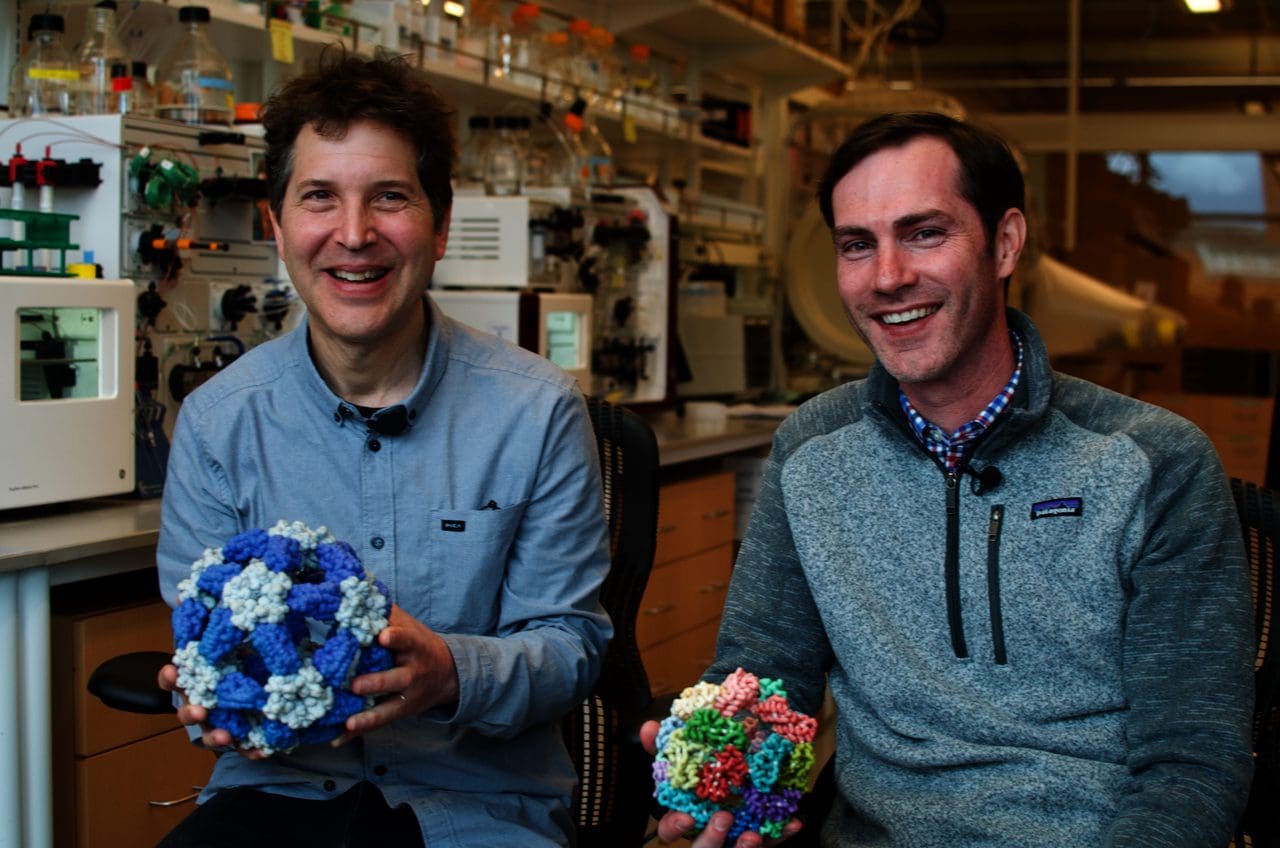A new, ultra-potent COVID-19 vaccine developed at UW Medicine could be available by the end of the year. The Institute for Protein Design (IPD) at the UW School of Medicine has taken a novel approach to develop a vaccine using proteins (complex molecules that carry out essential functions in the body).
The vaccine is one of many advances the IPD has made this year in response to COVID-19, thanks to support from The Audacious Project — a national philanthropic collaboration that discovers and funds projects with the potential to change the world. Support leveraged via The Audacious Project was made possible through the generosity of Laura and John Arnold, Steve and Genevieve Jurvetson, Chris Larsen and Lyna Lam, Lyda Hill Philanthropies, Miguel McKelvey, the Clara Wu and Joe Tsai Foundation, Hansjörg Wyss and Rosamund Zander, and several anonymous donors.
“The mission of the IPD is to design new proteins to address 21st-century challenges,” says David Baker, PhD, director of the IPD and the Henrietta and Aubrey Davis Endowed Professor in Biochemistry. “Recently, it’s been the challenge of the coronavirus pandemic. We’ve been able to make a lot of breakthroughs that wouldn’t have been possible without support from The Audacious Project.”
Unlocking the power of proteins
The IPD is the world leader in de novo, or “from scratch,” protein design. While the IPD itself was formally established in 2012, Baker and his team have been studying proteins for more than 20 years.
“Proteins are the underpinnings of all living things,” says Lance Stewart, PhD, MBA, chief strategy and operations officer at the IPD. “They carry out all of your cellular functions, calculate your thoughts and carry out energy metabolism. Because of their many functions and diverse roles in life, we’d like to totally understand the principal functions of proteins. And the best way to do that is to design them from scratch.”
In 2019, the IPD received $45 million from The Audacious Project to advance its goal of designing a new world of synthetic proteins.
“The Audacious Project is an amazing collaborative effort between TED and The Bridgespan Group,” says Neil King, PhD, assistant professor of biochemistry and faculty member of the IPD. “It extends the TED principles of ‘ideas worth spreading’ to philanthropy by finding ideas that need catalytic funding to take them to the next level.”
The funding helps the IPD invest in technology, equipment, supplies and staffing to support its innovative research in medicine, energy and manufacturing. And the flexibility of the donation allows the IPD to shift priorities based on new opportunities and challenges — like COVID-19.
“While we weren’t planning to work on COVID-19, the flexible funding from The Audacious Project allowed us to rapidly pivot,” says Stewart. “In pandemic preparedness, you need a trifecta of vaccines, therapeutics and diagnostics. We were able to de novo design all the components in a year and get them out and published in the world.”
Combatting COVID-19 with proteins
Scientists in King’s lab and that of his colleague David Veesler, PhD, associate professor in the Department of Biochemistry — including lead investigators Brooke Fiala, senior associate scientist at Icosavax and King Lab alumna; and Lexi Walls, PhD, a research scientist in the Veesler lab — focused on designing a nanoparticle vaccine candidate. The vaccine is currently in clinical trials with both SK bioscience in Korea and Seattle biotechnology company Icosavax.
Preliminary trials show that the IPD vaccine can be stored at room temperature for at least a month, with no changes to its integrity. The stability and ease of manufacturing could make the vaccine a more viable option for places in the world where refrigeration is scarce.
While results won’t be known until clinical trials are complete, the research team is optimistic that the vaccine candidate will have an efficacy rate of nearly 90%.
“The result of this designed particle is incredibly stable and is scalable for a manufacturer,” says Fiala. “And it’s ultra-potent, with five times less the dose and ten times greater of an antibody response, compared to the spike protein encoded for by mRNA vaccines available on the market.”
Meanwhile, scientists in Baker’s lab are creating new ways of treating and detecting COVID-19 using proteins.
“Our therapeutic is a designed protein that binds to the virus itself,” says Baker. “We have designed proteins which completely prevent the virus from entering our cells. That is now being developed as a drug and is going to start clinical trials soon.”
Developing the trifecta (vaccines, therapeutics and diagnostics) to fight the pandemic in such a short amount of time has been a significant accomplishment for the IPD.
“The teams at the IPD have done extraordinary work,” says Baker. “The vaccines and therapeutics are super promising, and it was all done in a remarkably short time, with many of the methods and concepts being worked out at the same time. I’m truly impressed at what we’ve been able to do.”

Left to right: David Baker, PhD, and Neil King, PhD.
Advancing five grand challenges
While COVID-19 research dominated the last 18 months, researchers at the IPD are making progress toward each of its five grand challenges funded by The Audacious Project:
- Building better vaccines for pathogens such as the flu, HIV and cancer.
- Expanding beyond nature’s alphabet of 20 amino acids.
- Creating advanced protein containers for targeted drug delivery.
- Designing smart protein systems that can identify cancerous or otherwise unhealthy cells.
- Making next-generation nanomaterials for use in solar energy capture and nanofabrication.
In addition to the COVID-19 vaccine, the IPD nanoparticle vaccine candidate for influenza recently entered clinical trials at the National Institutes of Health. A candidate for a respiratory syncytial virus (RSV) vaccine will follow later this year.
“We’ve now got clinical programs in three different indications, which is exciting because we’ve only been working on this for a few years,” says King.
A new therapeutic for cancer is in clinical trials, and therapeutics for celiac disease and inflammatory bowel disease are also underway.
“We believe that we’re creating the way of the future in medicine for therapeutics and vaccines,” says Baker. “The more we learn about how to design new proteins, the more different possibilities there are for making the world a better place.”


